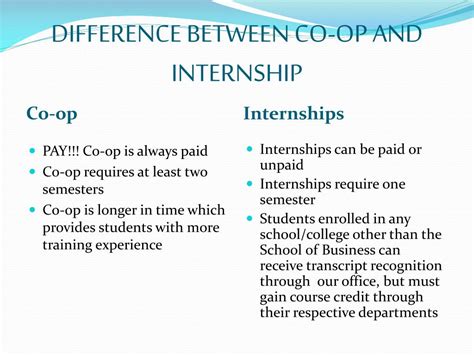Internship Vs. Co-Op: Understanding The Difference

When it comes to gaining experience in a professional setting, two common options are internships and co-ops. While they may seem similar at first glance, there are key differences between the two that can impact your career trajectory. In this post, we’ll explore the differences between internships and co-ops, as well as the advantages and disadvantages of each option.
What is an Internship?
An internship is a short-term work experience typically lasting a few months, where a student or recent graduate works at a company or organization to gain hands-on experience in their field of study. Internships can be paid or unpaid and can take place during the summer or academic year. Internships are often part-time and can be completed alongside coursework.
Advantages of an Internship
- Provides hands-on experience in a specific field
- Can lead to a job offer or a recommendation for future employment
- Opportunity to network and make connections in the industry
- Flexible schedule that can be completed alongside coursework
Disadvantages of an Internship
- May be unpaid or low-paying
- Short-term nature may not allow for in-depth skill development
- May not provide the same level of mentorship as a co-op
What is a Co-Op?
A co-op, or cooperative education, is a partnership between a university and an employer that allows students to gain extended work experience in their field of study. Co-ops are typically full-time and can last multiple semesters, alternating between semesters of work and coursework. Co-ops are often paid and provide a structured learning experience that includes mentorship and training.
Advantages of a Co-Op
- Provides an extended period of work experience in a specific field
- Often paid, providing financial support during the academic year
- Structured learning experience that includes mentorship and training
Disadvantages of a Co-Op
- Requires a significant time commitment that may delay graduation
- May not be feasible for students with other obligations, such as family or work
- May not provide the same level of flexibility as an internship
FAQs
What is the main difference between an internship and a co-op?
The main difference between an internship and a co-op is the length and structure of the work experience. Internships are typically short-term and can be completed part-time alongside coursework, while co-ops are typically full-time and can last multiple semesters, alternating between semesters of work and coursework.
Are internships or co-ops more valuable for my career?
Both internships and co-ops can be valuable for your career, depending on your goals and preferences. Internships provide hands-on experience and networking opportunities, while co-ops provide an extended period of work experience and structured learning.
Are internships and co-ops always paid?
No, both internships and co-ops can be paid or unpaid, depending on the employer and industry. It’s important to research the compensation and benefits offered by a potential employer before accepting an internship or co-op.
Can I do both an internship and a co-op?
Yes, it’s possible to do both an internship and a co-op, depending on your academic schedule and availability. However, it’s important to consider the time commitments and responsibilities of each option before committing to both.
How do I find internships and co-ops?
You can find internships and co-ops through your university’s career center, online job boards, and networking events. It’s important to research potential employers and tailor your application materials to each opportunity.
Conclusion
Internships and co-ops can both provide valuable work experience and networking opportunities for students and recent graduates. While they have their differences, both options can contribute to a successful career path. It’s important to consider your goals and preferences when choosing between an internship and a co-op, and to research potential employers to ensure a positive and productive work experience.
